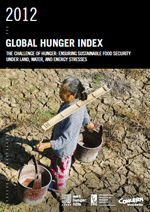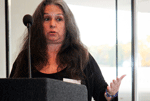News
Published on Thu, 2012-11-15 14:40

Nabeel Rajab (Photo: BCHR)
|
The Observatory for the Protection of Human Rights Defenders, a joint programme of the International Federation for Human Rights (FIDH) and the World Organisation Against Torture (OMCT), deplored the Bahrain Appeals Court’s refusal to refer a petition for preliminary ruling on the legality of the law prohibiting demonstrations in Bahrain and to release Nabeel Rajab, who has been arbitrarily detained since July 9.
|
Published on Thu, 2012-11-08 15:28
As the federal government of Canada continues to move forward towards the Comprehensive Economic Trade Agreement (CETA) with the European Union, a new research produced by the Nova Scotian provincial office of the Canadian Center for Policy Alternatives (CCPA) finds that the benefits are being oversold while the costs and consequences are being minimized and even ignored.
|
Published on Thu, 2012-11-08 13:13

Photo: Bahrain Center for
Human Rights
|
The Bahrain Human Rights Society (BHRS) called on the regime to “repair the tense political situation” created when it imposed a ban on public demonstrations and gatherings. “Day after another the Bahraini authorities prove their avoidance from the obligations placed on them following the ratification of the international covenants on human rights,” warned the organization in a statement.
|
Published on Thu, 2012-11-08 09:25

Gujarati Legislative Assembly.
|
Gujarat Social Watch (GSW, member of Social Watch India) revealed this week, in its review of the 10th session of the 12th Gujarati Legislative Assembly, that the chief minister (head of the state government) Narendra Modi spoke only three times in the entire session, which lasted 30 days.
|
Published on Thu, 2012-11-08 07:43

A class on data capture, entry,
analysis, application, presentation
and dissemination at Ntinda Valley
Resort, Iganga. (Photo: DENIVA)
|
Uganda Bureau of Statistics (UBOs) and the Development Network of Indigenous Voluntary Associations (DENIVA, national focal point of Social Watch) have delivered a three-day training course on data management and report writing skills for several civil society organizations (CSOs).
|
Published on Thu, 2012-11-01 11:26

IFPRI's 2012
Global Hunger Index
|
“Decades of effort and rhetoric have failed to eradicate hunger in the world.” This is the emphatic and harsh conclusion of the Global Hunger Index. In 2000, more than a hundred presidents, kings, prime ministers and ministers from all over the world signed the Millennium Declaration in which they promised to spare no effort to, among other things, “cut by half (by 2015) the proportion of people suffering from hunger.” This goal will not be reached. More than a billion people will go to bed hungry tonight. There are more hungry people today than there were at the start of the century. The proportion has fallen because total world population has increased, but it has not fallen enough.
|
Published on Thu, 2012-11-01 09:44

The High Level Panel of
Eminent Persons.
(Photo: Eskinder Debebe/UN)
|
The High Level Panel (HLP) appointed by the UN Secretary General Ban Ki-moon to consider the post-2015 development agenda is opening in London the discussion on poverty eradication. Its members should have in mind the strong pronouncement of the civil society organizations that took part in a previous global online consultation: they demanded not to leave the human rights and the environment aside in the fight against poverty, and to address the growing inequality, among other requirements.
|
Published on Wed, 2012-10-31 13:19

Photo : Radio Canada
|
The province of Saskatchewan’s public liquor retail system is superior to both Alberta and British Columbia’s private scheme in terms of price, revenue generation and mitigation of social harm, concluded in a new report the Saskatchewan office of the Canadian Centre for Policy Alternatives (CCPA, one of the focal points of Social Watch in that North American country) and the Parkland Institute.
|
Published on Wed, 2012-10-31 09:56

Quinn Dombrowski/CC/Flickr
|
Developing countries are taking actions to promote cheaper medicines through compulsory licensing for the benefit of their populations, with Indonesia being the latest case. In one of his more recent columns The Star, one of the leading Malaysian newspapers, Martin Khor, executive director of South Centre, analyzes the current situation in the whole world.
|
Published on Mon, 2012-10-29 14:25

Anabela Lemos.
(Photo: Atte Keinänen/Kepa.)
|
"Land grabs" in the Global South have caused much debate and concern during the last couple of years, especially since the global food price crisis of 2008. Kepa, a platform for Finnish NGOs interested in development issues and focal point of Social Watch in that European country, held a discussion on the issue this month. Tuomo Alhojärvi wrote a report on the debate for Kepa’s website.
|

|













